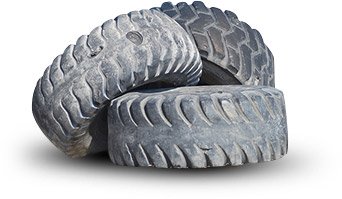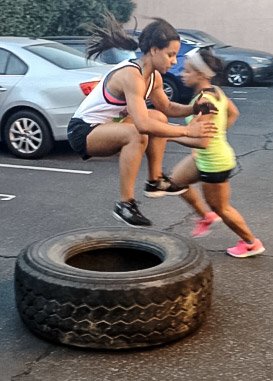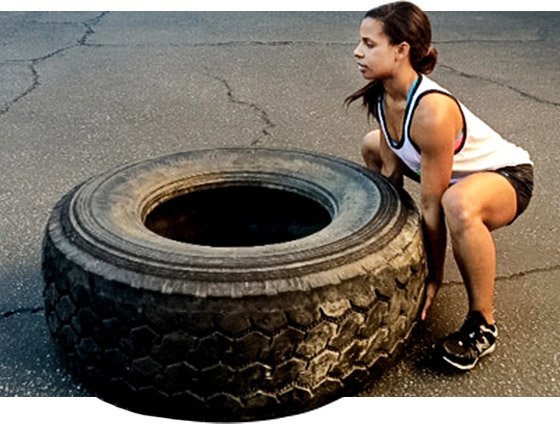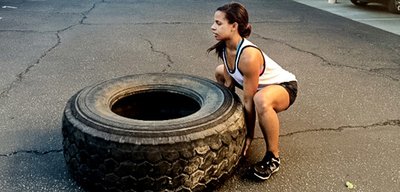Summer might be winding down, but that doesn't mean you have to kiss outdoor workouts goodbye. There's no better way to push yourself while enjoying the fresh air than with a tire workout. This one, basic piece of equipment offers up a ton of workout variations. Plus, tires can be acquired rather easily and are great for challenging your power, strength, and conditioning.
I have an NCAA D1 background in volleyball and track, and I like to keep sports performance and functional training in my regimen. While I currently train for a balanced and well-conditioned physique to compete as an IFBB bikini pro, that doesn't mean I need to let my athleticism suffer. Tire workouts are the perfect way to get physique and performance benefits in one stop.
Where To Get Your Tires
I purchased my giant tire from a local shop. Not sure where to get yours? Do some research online to scope out a tire dealership or a place that sells farm tires. In most cases, they'll be pretty cheap (between $20-100). Otherwise, drive around with your eyes peeled for a free junkyard tire.

The next step is to consider the weight you want to use. For women, I suggest anywhere from 100-300 pounds, which will vary depending on your strength and goals. (I weigh 105 pounds, and my tire is roughly 200 pounds.) For men, 300-500 pounds is great to kick your workout into high gear.
Keep in mind that, if you want to rep it out, you can still have an effective workout with a relatively light tire. Safety is top priority, so stick with a size that's realistic for you.
Hit The Road
Once you've got your weapon of choice, you can throw any or all of the following exercises together in a full circuit-style workout, or you can do them individually. Again, consider what's most realistic for you and how you like to train. The weight of your tire will help you determine the reps and sets in your program.
Below are some of my favorite exercises and their benefits. Check them out!
Tire (Box) Jumps
Lay your tire flat on its side like a box. Face the tire with your feet shoulder-width apart. Squat down slightly, as if you're going to jump straight into the air. Your arms will naturally swing backwards and return forward as you leap onto the tire. Both feet should land softly on the tire. While the tire has some give to it, landing too heavily can hurt your knees upon impact. Consider this practice.
Benefit: Tire jumps are a functional exercise that can help improve your explosiveness for running and increase your vertical jump. As your vertical jump improves, test yourself by gradually increasing the height of the object you're using.
Triceps Dips
Facing away from the tire, place your arms behind you. Rest the palms of your hands on the tire with your arms fully extended. Place your feet approximately half of your body length in front of the tire. This will be your starting position. Bend at the elbows into a 90-degree angle while lowering your body slowly until your bottom almost touches the ground. Return to a straight-arm position. This is one full repetition.
Benefit: This exercise is the same as a bench dip—it's a slow, controlled movement to work your triceps. If the movement is too easy, add a plate to your lap or use it as an "active rest" in between other tire-based exercises.
Decline Push-Ups
This exercise really takes floor push-ups from beginner to advanced. Facing away from the tire, place your hands on the floor slightly wider than shoulder-width apart. Place both of your feet on the tire behind you and raise yourself up into a plank position. Keeping your body straight, lower your upper body toward the floor by bending both arms at 90-degree angles. Next, push up until your arms are fully extended again.
Benefit: This will primarily work the upper pectoral muscles, in addition to the lower pecs and core.
Lateral Jumps
Begin by standing upright and parallel to the tire. Next, squat slightly, bending your knees in a way that distributes your weight evenly. Avoid curving your back or bending at the hips. Jump sideways (laterally) onto the tire, and land in a half-squat position. As with a box jump, you want to land softly to lessen impact. Step (or jump) down from the tire and repeat.
Benefit: Lateral movements—jumps, in this case—are a great way to develop power and agility through explosiveness while improving strength in your lower body (hip abductors, adductors) and stability in your ankles, hips, and knees. Performing a lateral jump includes squatting, a great lower-body and core exercise.
Toe Touches
Stand facing the tire. Drive your left knee up and touch the tire with your toe. As your left knee drives up, your right arm will swing back, similar to a running stance. Return your left foot to the ground as you drive your right knee up, your left hand back, and your foot to the tire. Repeat. The key is to move as quickly and swiftly as possible. The lighter you tap the tire, the quicker you can switch feet.
Benefit: This exercise focuses on acceleration and foot speed and develops your hip flexors. Weak hip flexors can affect your stride length and overall speed.
Step-Ups

Face the tire and place your left foot on it. Use this platform as a foundation to push off the step. Push through your heel to explode vertically. While in the air, your legs will naturally meet again side by side; switch your opposite leg to rest on the tire as you come down. Land softly on the ball of your stable foot so you can promptly explode back up to repeat.
Benefit: This exercise trains the legs and hips with the quads and glutes. The intent is to explode from the tire in a speedy manner, and this explosiveness can be transferred into many sports activities.
Broad Jumps Over Tire
Stand straight with your feet shoulder-width apart. Drop into a squat as you swing your arms back. As you explode into your maximum jump, swing your arms through, using that momentum to thrust your hips forward and land as far forward as possible. You should land in a controlled squat position with both feet. A strong core can help you land properly.
More advanced broad jumpers can perform this one leg at a time. The key to a broad jump is to jump as far forward as possible from a static position, and to land balanced. The momentum should not be generated with a prestep or hop before the jump.
Benefit: This is a great exercise to develop explosive power and improve the fast-twice muscle fiber reaction; it requires your leg and core muscles to quickly contract to create maximum force with each jump.
Pop Squats
Lay the tire flat on the ground. Stand in the hole in the center of your tire. Bend your knees slightly and hop upward to land on the tire in a 90-degree squat with both feet on opposite sides of the tire. Hop upward again, returning to a standing position within the hole of the tire. This is one repetition. Repeat.
Benefit: Pop squats target your glutes, quads, hamstrings, and core. Do enough of these at a relatively fast pace and you'll also improve cardiovascular endurance.
Tire Flips
Start with the tire flat on the ground. Place your fingers under the tire while it is in this position. Your hands and feet should be shoulder-width apart. Squat down deep, bending at the knees. As you return to a standing position, pull the tire up. Make sure to use your whole body—especially your legs—to avoid lifting solely with your back. The momentum you create should allow you to change your hand position from a pull to a push. Push the tire forward. Once it is flat, repeat the process.
Benefit: Tire flips cover all the bases—your core, back, legs, arms, and shoulders. Just be careful when you bend to pick the tire up. Leave your ego at home! If you need a lighter tire, make the switch. You can risk serious injury if you are bending at the hips and using your back instead of bending at the knees and using your full body and engaged core to lift and push.

"Tire flips cover all the bases—your core, back, legs, arms, and shoulders."
Advanced Moves
If you're very comfortable with the above exercises, then I encourage you to try some more advanced tire workouts. How do you know if you are ready? Use the following as a gauge:
- You weight train frequently and are familiar with pushing and pulling twice your body weight (or the weight of your tire).
- You do exercises such as box jumps, broad jumps, or other sports performance training regularly.
- You often train with HIIT-style workouts.
- You can do 10 or more tire flips continuously (with the size of tire you have available).
Back And Forth Tire Flip
This is a three-step process (two jumps and a flip). First, you jump into the hole of the tire. Second, you jump forward (out) of the tire, landing on the opposite side you came from. Lastly, you turn to face the tire and prepare to flip it in the direction you came from. Repeat for 8-10 flips, or as many as you can before you need to rest.
Benefit: This is a power and strength exercise from head to toe. As an added benefit, it also tests your cardiovascular system!
Tire Pushes (Partner Exercise)
The tire should be standing upright. You and a partner will each face one side of the tire and stand about arm's-length apart. Prepare your foundation with a staggered stance; plant one foot slightly ahead of the other at a distance that feels good for you. Place your hands (palms facing forward) in line with your chest, and push the tire back and forth. Your elbows should be slightly bent, so you can receive the tire with a cushion, and then push the tire back to your partner.
Benefit: Similar to the bench press, this movement engages your chest as you push, and your arms as you receive the tire from your partner. You also need strong legs and core to withstand the weight of the tire. This is a fun way to work on your upper-body strength.
Tire Flip To Sprint
Have a friend time you as you complete tire flips for 20-25 yards. Once you finish flipping— from start to finish—turn around and sprint back to the start. Take a 1-2 minute rest as your friend completes the same exercise. Complete two more rounds, and try to beat your time each round.
Benefit: This strengthening exercise also incorporates explosive power from sprints.
Burpee + Lateral Jumps
Lateral jump from one side of the tire, onto the tire, and then onto the other side. Complete a burpee. Jump laterally back onto the tire, then jump onto the other side. Do a burpee. Repeat. One burpee on each side of the tire is 1 full repetition. Complete 10 reps in each set.
Benefit: Burpees and jumps alone can get old fast. This is an unconventional way to take regular exercises to another level. Is the tire necessary? Not really, but it's a fun one to try with a partner, or alone to really get your heart pumping.
The Workout
Now, let's put it all together! Here's a glimpse of how I would combine the exercises we just discussed. Warm up with a 10-minute run/walk followed by dynamic stretching. This is crucial; don't forget to stretch!
I have the circuit broken down into three groups of three exercises. All nine exercises equal one round. You may take a rest after every third exercise, if needed. If not, power through until you complete one full round. Then, take 1-2 minutes rest.
Tire Circuit: 3 rounds
- Box Jump (On Tire) 20 reps
- Decline Push-Up 10 reps
- Toe Touch 15 reps each leg, optional rest
- Broad Jump Over Tire 15 reps
- Triceps Dip 15 reps
- Back-and-Forth Tire Flip 6-8 reps, optional rest
- Pop Squat Jump 20 reps
- Step-Up 15 reps each leg
- Lateral Jump 10 reps each side, rest 1-2 minutes
Finishing Move
Looking for that little extra push? One you've finished three rounds, try this gasser. Complete a 20-25 yard continuous tire flip to one end of the street; then sprint back to the start. Have your partner time you. Rest for 1 minute and repeat 3-5 times, trying to set a PR each time.
Vital Stats
- Name: Rachelle Dejean
- Height: 5'2"
- Occupation: Marketing Coordinator, Coach, IFBB Bikini Pro
- Website: www.rachelledejean.com

